|
sito + "/AREA=" + sezione + "/AAMSZ=" + misura + "/ACC_RANDOM=" + bumber + "/PAGEID=" + pageid + "'>"); document.write(""); |
| home > allestimenti |
|
sito + "/AREA=" + sezione + "/AAMSZ=" + misura + "/ACC_RANDOM=" + bumber + "/PAGEID=" + pageid + "'>"); document.write(""); |
| home > allestimenti |
| Metamorph Asymptote |
||||
| The
program of this year's Venice architecture biennale, curated by Kurt
W. Forster, will be articulated, as usual, in two distinct environments:
the Giardini and the Arsenale. Asymptote's complete engagement in the
exhibition -from installation and exhibition design to graphic identity
and catalogue design (with Omnivore)- provides for a seamless experience
and a spatially cohesive backdrop to the curator's theme METAMORPH.
Especially striking and engaging is Asymptote's complete transformation
of the enfilade of longitudinal spaces in the Arsenale into a modulating
terrain on which over 220 projects are exhibited with models, drawings
and video installations. The computer generated morphing animation sequence
used to conceive the stage in the Arsenale was derived from combining
perspectival geometry with the actions of torquing and stringing. Far
from offering an unfriendly and solely geometrical experience, the stage
for the Arsenale's discursive exposition is highly captivating for the
visitor, and spatially it is a lot more stimulating and pleasing than
what the renderings and wireframes already anticipate. ARCH'IT presents,
in the words of New York based Asymptote, the project for the exhibit
design of the Biennale. Hani Rashid's sharp and energetic answers to
Luca Molinari's interview
further explain the design concept. [PG] |
||||
| INSTALLING
SPACE. During the Italian Renaissance, Bramante's perspectival experiment
in Santa Maria delle Grazie, a small church in the center of Milan,
was not only an elegant architectural solution for a confined space
but (more importantly for the architect) was a test environment for
the future Saint Peter's Cathedral in Rome. This precise intervention,
predicated on the new found geometric principles around perspective
projection, afforded Bramante the opportunity to envision his ideas
as approximating full scale, producing a diorama of the great cathedrals
'potential' interior. |
[13sep2004] | |||
  Study of the Arsenale. |
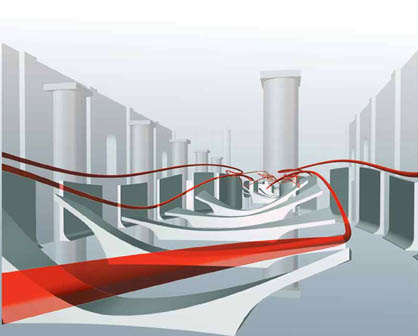 Another predecessor to our modern notion of installation architecture is in the design of Andrea Palladio's Teatro Olimpico built in Vicenza in 1584. This 'permanent' intervention into the theater's existing situation was essentially a full-scale environment enacted as a test of sorts, pointing the way to an ideal in city space and architecture. The Teatro, again utilizing perspectival geometry, was used not only to investigate architectural motifs and proportional systems, but also for envisioning a 'perfected' model of city space, a surrogate for a new architecture. |
|||
 Study of installation at the Giardini. |
There are many similar examples of interior interventions
that are not simply decorative but also act as proxy architectural constructs
utilizing the almost 'controlled' environment of an existing structure
in order to enact an architectural experiment to scale. Later the interior
structures and architectures of the Baroque and Rococo periods became
preoccupied with precise reenactments of the natural state beyond, albeit
in a perfected mode. And through to our present day situation, installations
into existing spaces as exhibition design or stand alone interior worlds
act as lenses onto an exteriorly that is either vivid and recognizable
as place, or abstracted and polemical as tendency and possibility. The
installation works of Frederick Kiesler for example employed experimentation
with form, meaning and geometry to produce highly spontaneous and curious
architectural installations. Kiesler's theater stage sets and exhibition
designs pushed the limits of what he aspired to create as an 'endless'
architecture. |
|||
|
The
list of early modern architects that experimented with full-scale installation
work that, in effect, became meditations on architectural futures includes
Theo Van Doesburg, André Bloc, and Moholy Nagy. These artists and architects
sought new forms of expression through experimental installations with
light, color and space. Technology and form continued to become intertwined
and critical to architectural interventions. |
||||
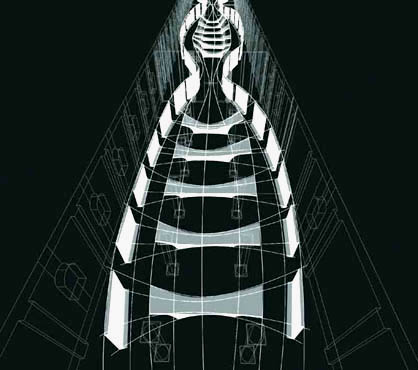 Study of the platform in the Arsenale. This is seen in the work of Russian Constructivists such as Vladimir Tatlin with his large-scale models of the Monument to the Third International and El Lissitszky with his elegant Proun Space installation work. Another Constructivist, Gustav Klucis made intriguing architectural installations in the form of Agitation Propaganda machines (Agit-Props) using architectural installations as works unto themselves, self contained structures to be deployed throughout small towns in the Russian landscape showing documentary films captured by Vertov. The architecture itself becoming a dynamic intervention, a device inserted into the landscape. This work heralded the beginning of what we could identify as the fusion of media and space into architectural form. 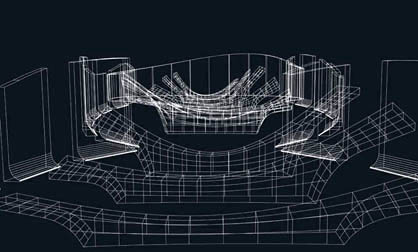 Study of the platform in the Arsenale. The evolution of these fluid architectures will be interesting to follow as architects become less concerned with differentiating between physicality and the virtual, increasingly becoming preoccupied with redefining what actually constitutes the spatial, and how we in fact move within this new spatiality. And ultimately it is within the space of the installation where these sorts of theses and assumptions can be tested. For Asymptote the space of exhibition reinterpreted as a place for experimentation is crucial for research and envisioning architectural futures and possibilities. METAMORPH INSTALLATION. The designs for all the exhibition areas by Asymptote are inspired by historic and contemporary influences and readings of these historically loaded environments. The Arsenale in particular has a colorful history as a place once used for navel ship building and the manufacture and preparation of kilometers of rope for the sails of the impressive Venetian ships of the 16th, 17th and 18th centuries. |
||||
 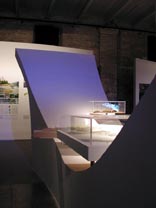 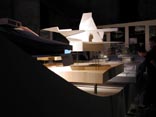 |
  |
 |
||
|
Asymptote's
transformation of the Cordiere in particular was predicted on a modulating
spacial sequence developed by producing a morphing animation involving
the actions of torquing and 'stringing' the entire space. By utilizing
the resulting 'key-frames', a sequence of elements with the potential
to be used as walls surfaces and platforms resulted. These resulting
forms and surfaces were further designed to accommodate models, drawings
and video for the Metamorph exhibition. The displayed works that move
along these 'trajectories' forming a terrain of tendencies and formations
as opposed to being simply displays. The experience of the exhibition
is therefore spatial and acts itself as an architectural entity celebrating
ideas, scale, form and meaning. Asymptotes' seamless integration of
architecture, installation, multimedia, graphic design and exhibition
design form a spatially integrated back-drop to the Metamorph theme,
making explicit a condition of variance, affinities and flux. Asymptote info@asymptote.net |
||||
| METAMORPH
- 9th International Architecture Exhibition of the Biennale di Venezia Venezia, Arsenale and Giardini di Castello |
||||
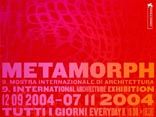 |
director: Kurt W. Forster information: La Biennale di Venezia Ca' Giustinian San Marco 30124 Venezia tel: 041 5218712 fax: 041 5218704 http://www.labiennale.org September 12 - November 7, 2004 exhibit design: architects: Asymptote principals: Hani Rashid and Lise Anne Couture lead architects: Jill Leckner and Noboru Ota project team: Eric Goldemberg, Asako Hiraoka Sperry, Clarissa Lenz, Ana Baltschun, Claudia Cipriani, Tobias Koch, Stella Lee, Simon Nageli, Dominik Sigg, Cara Solomon, Charlotte Schmidt-Jensen, Stephanie Wong, Christoph Ziegler graphic designer: Omnivore Alice Chung and Karen Hsu lighting designer: Arup Lighting Rogier van der Heide IALD lighting consultant: Marciano Rizzo/ Venice Biennale |
|||
| Asymptote. Hani Rashid is a practicing Architect who received a Master's degree in Architecture from the Cranbrook Academy of Art in 1986. In 1989 he co-founded with Lise Anne Couture Asymptote, an award winning architecture, design and art practice based in New York city. In 1990 Rashid contributed to the implementation of the Advanced Architecture Design program at Columbia University Graduate School of Architecture and Urban Planning, later in 1995 he contributed to the development of the school's Digital Design Studio program. Hani Rashid has also been a visiting professor and lecturer at numerous universities including the Royal Danish Academy in Copenhagen, the Southern California Institute of Architecture and UCLA in Los Angeles, the University of Lund in Sweden, and the Graduate School of Design at Harvard University. Asymptote has produced an extensive body of work including the Guggenheim Virtual Museum, the Advanced Operations Center for the New York Stock Exchange, and a line of system office furniture designed for Knoll International. In 2000 Hani Rashid represented the United States at the American pavilion of the Venice Biennale of Architecture, and in 2002 the work of Asymptote was featured at Documenta XI in Kassel. Most recently Asymptote has completed the construction of HydraPier in the Netherlands, a structure located near the airport of Schipol which houses technology and art. Currently Hani Rashid is working on a number of key projects including the design of the upcoming Venice Biennale of Architecture and a new theater venue for the Hans Christian Andersen festival in Odense, Denmark. The work produced by Asymptote has been featured in several publications including most recently the "What's Next" issue of Time magazine and in various exhibitions including the "Non-Standard Architecture" at the Centre Pompidou in Paris, and a large scale survey show of Asymptote's work at The Netherlands Institute of Architecture in Rotterdam. Hani Rashid and Lise Anne Couture were honored as the recipients of the 2004 Frederick Kiesler Prize for Architecture and the Arts. | ||||
|
All images courtesy of: Asymptote: Hani Rashid and Lise Anne Couture. Photos of installation by Susanne Lambert. |
||||
|
>
FILES: INTERVIEW WITH HANI RASHID |
||||
|
La
sezione Allestimenti laboratorio
|